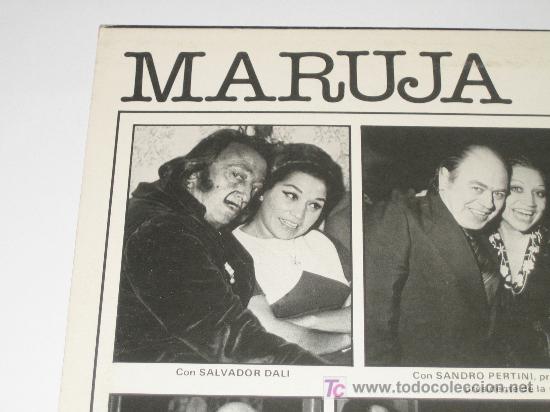2
















| Thumbs Up |
| Received: 7,538 Given: 4,802 |

Las Grecas.
Las Grecas was a Spanish musical duo of Flamenco - rock formed in 1973 by two romani sisters, Carmela Muñoz Barrull (Valladolid, July 19, 1954), and Edelina Muñoz Barrull (Madrid, February 17, 1957 - Aranjuez, January 30, 1995), better known as Tina. They had a huge initial success with the theme "Te estoy amando locamente" love you madly) which sold 500,000 copies. Their career later declined when the Muñoz sisters decided to dissolute Las Grecas.
https://en.wikipedia.org/wiki/Las_Grecas

https://www.yfull.com/tree/E-BY7449/
E-V22 - E-BY7449 - E-BY7566 - E-FT155550
According to oral family tradition E-FT155550 comes from a deserter of Napoleon's troops (1808-1813) who stayed in Spain and changed his surname.














| Thumbs Up |
| Received: 7,538 Given: 4,802 |

Azúcar moreno
Azúcar Moreno (Spanish pronunciation: [aˈθukaɾ moˈɾeno]; Spanish for "brown sugar") is a Romani Spanish music duo consisted of sisters Antonia "Toñi" and Encarnación "Encarna" Salazar. The duo has sold more than 3 million albums and singles since 1984 domestically, and became famous in Europe, the United States and Latin America in the 1990s, with approximately 12 million albums sold worldwide.
Consisting of sisters Antonia "Toñi" (14 March 1963) and Encarnación "Encarna" Salazar (10 January 1961), the singing duo comes from Badajoz.
https://en.wikipedia.org/wiki/Az%C3%BAcar_Moreno

https://www.yfull.com/tree/E-BY7449/
E-V22 - E-BY7449 - E-BY7566 - E-FT155550
According to oral family tradition E-FT155550 comes from a deserter of Napoleon's troops (1808-1813) who stayed in Spain and changed his surname.














| Thumbs Up |
| Received: 7,538 Given: 4,802 |

Eurovision Song Contest 1990. Zagreb. Yugoeslavia.
Bandido. Flamenco tecno rumba.
"Bandido" (Spanish pronunciation: [banˈdiðo], "Bandit"), written by José Luis Abel and composed by Raúl Orellana and Jaime Stinus, was Spain's entry in the Eurovision Song Contest 1990, performed by the sister duo Azúcar Moreno. It was covered by Aşkın Nur Yengi, Turkish singer as "Zehir Gibisin" ("You're like a poison" in Turkish) in her second album, Hesap Ver (Explain in Turkish), which was released in 1991.
Internal selection
Televisión Española (TVE), the national broadcaster of Spain, used an internal selection process to choose Azúcar Moreno, who were becoming popular by combining traditional Spanish flamenco roots with urban contemporary musical styles, in this case electronic music. The song chosen to go with them to Zagreb, Croatia (then Yugoslavia), "Bandido", was produced by Raúl Orellana, one of the most respected dance music producers in Spain. The studio recording includes the spoken intro "Ladies and gentlemen, it's showtime at the Apollo Theater. Everybody, the hardest-working man in show business", sampled from James Brown's 1963 album Live at the Apollo.
Technical difficulties
One notable aspect of the performance was due to a technical glitch, in that one of the backing tracks started in a later position than expected. The two singers started their choreographed dance before the song, realized the tape was in the wrong position, and abruptly walked offstage in a huff, leaving viewers to wonder what had happened. After the two left the stage, BBC commentator Terry Wogan remarked, "Let's hope it doesn't go on like this or we're in for a very long night, ladies and gentlemen. After two minutes, during which the arena became silent, the sisters returned and the song was then performed in its entirety without a hitch. In 2003, BBC chose "Bandido," and all the events and difficulties surrounding the performance, as one of the most memorable moments in Eurovision history.
Chart success
After the contest, "Bandido," as a single and album, propelled Azúcar Moreno to superstardom not only in Spain, but also in Europe and Latin America, where they continued to have success for the next decade.
https://en.wikipedia.org/wiki/Bandido_(song)
https://www.yfull.com/tree/E-BY7449/
E-V22 - E-BY7449 - E-BY7566 - E-FT155550
According to oral family tradition E-FT155550 comes from a deserter of Napoleon's troops (1808-1813) who stayed in Spain and changed his surname.















| Thumbs Up |
| Received: 9,887 Given: 9,335 |

The Gipsy Kings are a group of flamenco, salsa and pop musicians from Arles and Montpellier in the south of France, who perform in Andalusian Spanish. Although group members were born in France, their parents were mostly gitanos, Spanish gypsies who fled Catalonia during the 1930s Spanish Civil War. They are known for bringing Catalan rumba, a pop-oriented music distantly derived from traditional flamenco music, to worldwide audiences. The group originally called itself Los Reyes.
Their music has a particular rumba flamenca style, with pop influences; many songs of the Gipsy Kings fit social dances, such as salsa and rumba. Their music has been described as a place where "Spanish flamenco and gypsy rhapsody meet salsa funk".















| Thumbs Up |
| Received: 7,538 Given: 4,802 |

Carmen Amaya.
Carmen Amaya (2 November 1918[1] – 19 November 1963) was a Spanish Romani flamenco dancer and singer, born in the Somorrostro district of Barcelona, Catalonia, Spain.
She has been called "the greatest Spanish Romani dancer of her generation"and "the most extraordinary personality of all time in flamenco dance."She was the first female flamenco dancer to master footwork previously reserved for the best male dancers, due to its speed and intensity. She sometimes danced in high-waisted trousers as a symbol of her strong character.
https://en.wikipedia.org/wiki/Carmen_Amaya

https://www.yfull.com/tree/E-BY7449/
E-V22 - E-BY7449 - E-BY7566 - E-FT155550
According to oral family tradition E-FT155550 comes from a deserter of Napoleon's troops (1808-1813) who stayed in Spain and changed his surname.














| Thumbs Up |
| Received: 7,538 Given: 4,802 |

Maruja Garrido.
Do you know who is this great artist, already retired, born in Caravaca de la Cruz (Murcia) in the difficult forties, the postwar times? Maruja Garrido was the artist who transformed rumba into a force of nature. Of flamenco essence, as befits her heritage: her father, El Niño de Levante, accompanied singing Carmen Amaya herself. Transferred to Barcelona she forms with her sister the duo "Las Cartageneras", which Juanito Valderrama would baptize. Later, already alone, she was the queen of tablao Los Tarantos.
http://www.turismocaravaca.com/blog/maruja-garrido/

https://www.yfull.com/tree/E-BY7449/
E-V22 - E-BY7449 - E-BY7566 - E-FT155550
According to oral family tradition E-FT155550 comes from a deserter of Napoleon's troops (1808-1813) who stayed in Spain and changed his surname.














| Thumbs Up |
| Received: 7,538 Given: 4,802 |

Bambino.
Miguel Vargas Jiménez was born on Calle Nueva de Utrera on February 12, 1940. He was the third child of the gypsy couple formed by Manuel Vargas Torres "Chamona" and Francisca Jiménez Ramírez, "Frasquita" Diego's daughter "Gaspar's" and sister of Manuel de Angustias. The Jiménez were known in Utrera, above all, because they had a meat board in the Mercado de Abastos. Miguel studied at the Salesian Schools of Utrera and was part of the Consolation Choir in his childhood, in an annex to the sanctuary that houses the patron saint of the city. In his adolescence he worked as a hairdresser with his father and in other Utrera barber shops. By then, in the mid-fifties, he was attracted to flamenco singing and dancing. Participated in the family parties of the community calé, organized for weddings, baptisms or sayings that had as protagonists close relatives.
https://es.wikipedia.org/wiki/Miguel...A9nez,_Bambino

https://www.yfull.com/tree/E-BY7449/
E-V22 - E-BY7449 - E-BY7566 - E-FT155550
According to oral family tradition E-FT155550 comes from a deserter of Napoleon's troops (1808-1813) who stayed in Spain and changed his surname.














| Thumbs Up |
| Received: 7,538 Given: 4,802 |

Remedios Amaya.
María Dolores Amaya Vega (born 1962 in Seville), better known by her stage name Remedios Amaya (Spanish pronunciation: [reˈmeðjos aˈmaʝa]), is a Spanish Romani flamenco singer. She represented Spain at the 1983 Eurovision Song Contest.[1]
Her first album, the self-titled Remedios Amaya, was published in 1978. In 1983 she was internally selected by Televisión Española to represent Spain in the Eurovision Song Contest 1983 in Munich. She scored nul points with the song "¿Quién maneja mi barca?".[2]
Amaya's first works, Luna nueva (1983) and Seda en mi piel (1984), were an example of flamenco-rock. In 1997 she released the album Me voy contigo (1997), produced by Vicente Amigo; the album sold more than 150,000 copies. It included her biggest hit, "Turu Turai".The following albums were Gitana soy (2001) and Sonsonete (2002), and in 2004 she released a Greatest Hits compilation. In 2016, she released a new album, Rompiendo el silencio.
https://en.wikipedia.org/wiki/Remedios_Amaya

https://www.yfull.com/tree/E-BY7449/
E-V22 - E-BY7449 - E-BY7566 - E-FT155550
According to oral family tradition E-FT155550 comes from a deserter of Napoleon's troops (1808-1813) who stayed in Spain and changed his surname.














| Thumbs Up |
| Received: 7,538 Given: 4,802 |

Peret
Pedro Pubill Calaf (Spanish: [ˈpeðɾo] Catalan: [puˈβiʎ kəˈlaf]; 24 March 1935 – 27 August 2014),[1][2] better known as Peret, was a catalan Romani singer, guitar player and composer of Catalan rumba from Mataró (Barcelona).
Known for his 1971 single, "Borriquito" (Ariola Records), Peret represented Spain at the Eurovision Song Contest 1974 with the song "Canta y sé feliz" and performed during the closing ceremony at the 1992 Summer Olympics in Barcelona.[3] In 2001, Peret recorded and released Rey De La Rumba (King of the Rumba) an album of updated versions of his older songs with guest musicians including Jarabe de Palo, El Gran Silencio, David Byrne of the Talking Heads, and more.
In 1982 Peret withdrew from the music industry, joining the Iglesia Evangélica de Filadelfia, a large religious community of the Spanish Roma (gypsies) devoting himself in the following years exclusively to preaching and religious activities. After leaving the church in 1991, he resumed his music activity and recorded new albums. In 1992, he was honored for all his body of work when he sang as representative of Catalonia at the Olympic Games in Barcelona during the closing ceremonies.
Peret died in Barcelona in 2014 from lung cancer, aged 7
Spanish Wikipedia for topics in Spain, better translate from Spanish to English.
https://es.wikipedia.org/wiki/Peret
Anglophone Wikipedia for very poor issues in Spain, better to use the Spanish version and translate it.
https://en.wikipedia.org/wiki/Peret
https://www.yfull.com/tree/E-BY7449/
E-V22 - E-BY7449 - E-BY7566 - E-FT155550
According to oral family tradition E-FT155550 comes from a deserter of Napoleon's troops (1808-1813) who stayed in Spain and changed his surname.














| Thumbs Up |
| Received: 7,538 Given: 4,802 |

"El Pescaílla" (pescadilla):Hake breeding. Marigolds are sold whole and sometimes they are fried curled biting the tail
Antonio González Batista, better known as El Pescaílla (asked to be called Pescadilla) 1 (Barcelona, March 3, 1922 - Alcobendas, Madrid, November 12, 1999), was a gypsy Spanish flamenco singer, guitarist and composer and rumba. Considered one of the fathers of the Catalan rumba, although his style had more flamenco nuances than that of the current Catalan rumba released by Peret in the mid-1950s. His style and way of interpreting and playing the guitar is still a Today reference of all the artists of this musical genre.
He was married to singer and dancer Lola Flores (1923-1995), with whom he had three children, singers Lolita Flores (1958), Antonio Flores (1961-1995) and Rosario Flores (1963). His granddaughters are actresses Elena Furiase (daughter of Lolita) and Alba Flores (daughter of Antonio). He was brother-in-law to the singer Carmen Flores and uncle of former soccer player and coach Quique Sánchez Flores.
https://es.wikipedia.org/wiki/El_Pesca%C3%ADlla
https://www.yfull.com/tree/E-BY7449/
E-V22 - E-BY7449 - E-BY7566 - E-FT155550
According to oral family tradition E-FT155550 comes from a deserter of Napoleon's troops (1808-1813) who stayed in Spain and changed his surname.
There are currently 1 users browsing this thread. (0 members and 1 guests)
Bookmarks